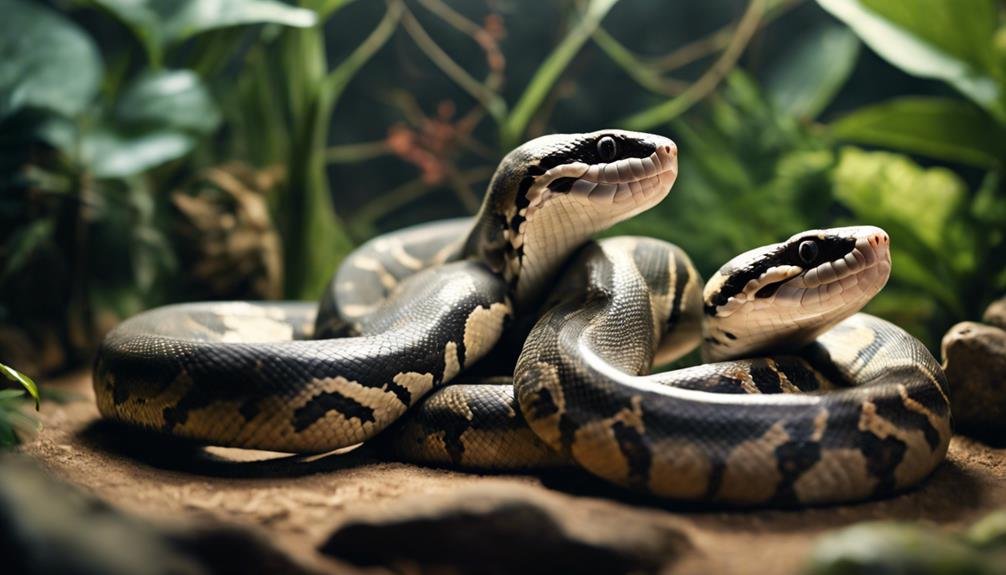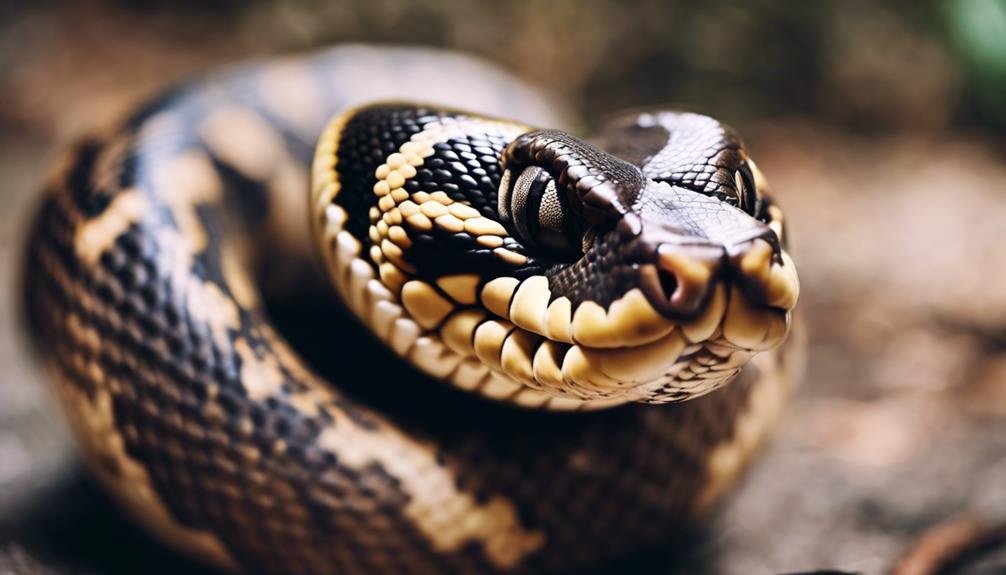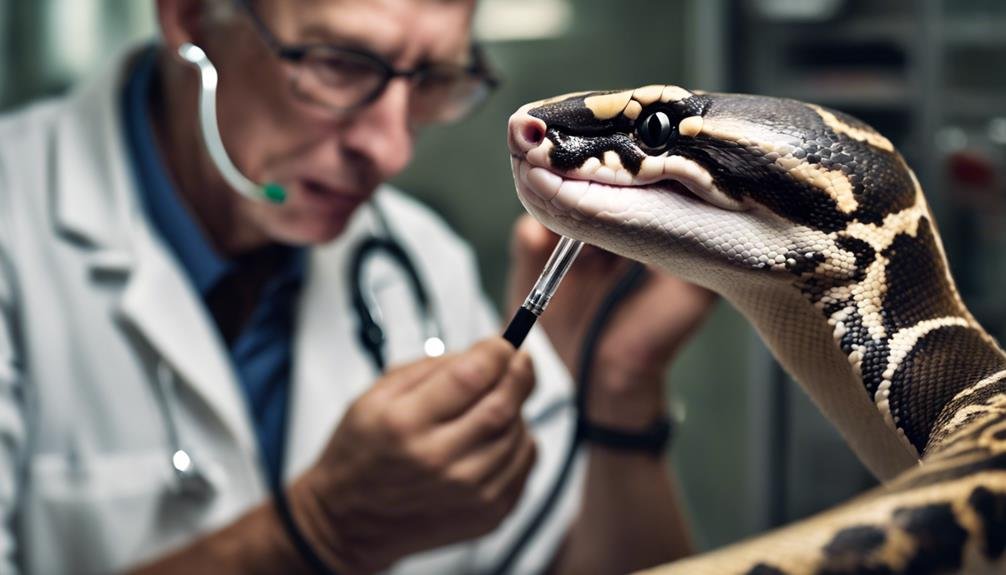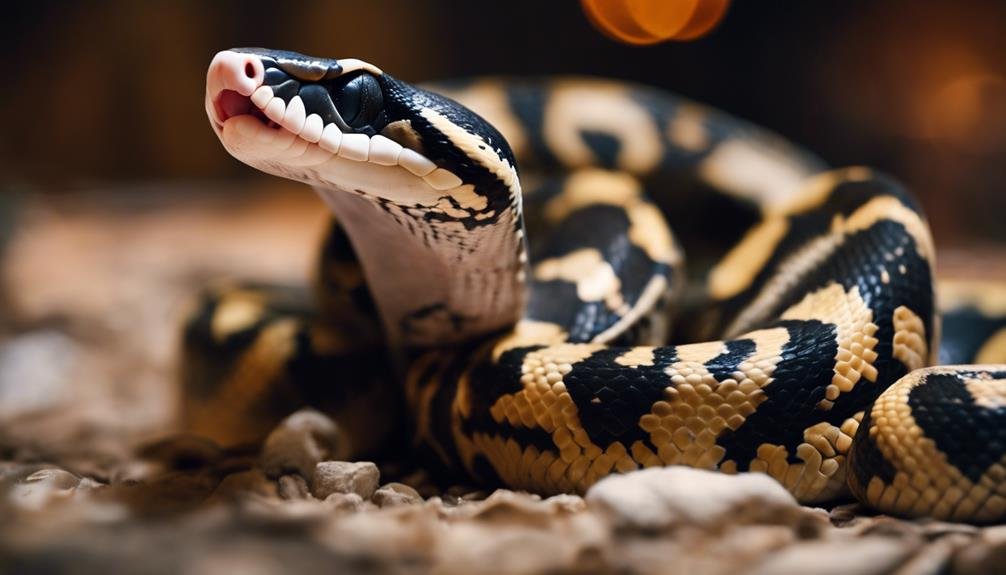Have you ever wondered why your ball python yawns? It's not just a sign of sleepiness as it might be in humans. Yawning in these fascinating creatures can indicate a variety of things, from the need to increase oxygen intake and stretch their jaw muscles to more complex behaviors like preparing to eat or even as a form of communication. While it's a natural and often healthy behavior, understanding the nuances behind why your ball python yawns can offer insights into its well-being and health. If you've noticed your snake yawning more frequently or in unusual patterns, it's worth exploring further to make sure they're not signaling something more concerning.
Key Takeaways
- Yawning in ball pythons aids in jaw stretching and realignment for optimal feeding mechanics.
- It enhances oxygen intake and supports respiratory function.
- Yawning allows for sensory information gathering through the Jacobson's organ, enhancing environmental awareness.
- It serves as a form of behavioral communication and can indicate the python's health status.
- Excessive yawning may signal stress, illness, or environmental discomfort, necessitating a health check.
Understanding Yawning
To get to the bottom of why ball pythons yawn, it's important to understand that this behavior isn't just about opening their mouths wide. As a ball python owner, you might've noticed your python yawning and wondered what it means. Yawning in pythons is a complex behavior that could be mistaken for a simple stretch of the mouth. However, it's far more than that. This natural behavior encompasses a range of reasons from the mundane to the serious.
Yawning serves several purposes in the life of a ball python. It's not only about adjusting their jaws after a hearty meal but also about their overall well-being. Ball pythons use yawning as a way to stretch and increase their alertness, which is vital for their survival in the wild and their comfort in captivity. Additionally, this yawning behavior allows them to gather sensory information through their Jacobson's organ, enhancing their ability to navigate their environment.
But, it's not all benign. Yawning can sometimes indicate stress, illness, or environmental discomfort. Ball python owners should be observant, as excessive yawning, especially when accompanied by wide-mouthed breathing, could hint at underlying respiratory issues. Recognizing these signs early can be key to addressing potential health concerns promptly.
Reasons for Yawning
You've noticed your ball python yawning and might wonder why.
It's not just a random act; yawning serves specific purposes such as enhancing oxygen intake, stretching their jaws, and as a form of behavioral communication.
Let's explore how each of these points plays an important role in their well-being and behavior.
Oxygen Intake Enhancement
Why do ball pythons yawn?
It's not just a sign of tiredness; it's an important way they enhance their oxygen intake. When they yawn, they're not just opening their mouths wide for no reason. This behavior is pivotal for oxygen intake enhancement. By expanding their oral cavity, they allow for increased air flow.
This doesn't only aid their respiratory function but also helps in gathering sensory input, like detecting scent molecules and understanding their environment better. Additionally, stretching jaw muscles through yawning supports overall respiratory health, facilitating the exchange of air necessary for essential physiological processes.
It's a complex action that ensures they're getting enough oxygen, playing a significant role in their survival and well-being.
Jaw Stretching Exercise
Ball pythons often yawn as a form of jaw stretching exercise, crucial for maintaining their jaw's optimal functionality after consuming large prey. This behavior isn't just a random act; it's a critical routine to guarantee their survival and health.
By yawning, they're realigning bones and ligaments in their head, which might've shifted during the process of ingesting large meals. This realignment is vital for keeping their jaw functionality at its peak.
Additionally, this jaw stretching exercise strengthens the jaw muscles, promoting proper jaw movement. It's an exercise that supports the health and agility of their feeding mechanism, ensuring they can continue to feed effectively on their prey.
Behavioral Communication Signals
While yawning serves as an important jaw stretching exercise, it also plays a significant role in the way ball pythons communicate their feelings and needs to others. This yawning behavior isn't just about adjusting jaw muscles; it's a pivotal tool for behavioral communication.
When you see your ball python yawning, they might be trying to gather environmental information or signaling their current physical and mental state. Whether it's showing relaxation, alertness, or even stress, each yawn carries a message. It's essential to pay attention to these cues, as yawning could also indicate respiratory issues.
Understanding the nuances behind their yawning helps you better interpret the subtle ways ball pythons share their feelings and needs, enhancing your bond with them.
Yawning and Jaw Resetting
Observing a ball python yawn can offer fascinating insights into how they reset their jaw muscles and ligaments after a meal. This isn't just an important behavior; it's a essential process for their digestion and overall jaw health. When you see your ball python yawning, it's adjusting its jaw structure to guarantee everything is in the right place, promoting peak functioning and flexibility. This natural mechanism is critical for maintaining the health of their unique jaw.
| Aspect | Function | Benefit |
|---|---|---|
| Yawning | Resets jaw muscles and ligaments | Aids in digestion |
| Jaw Realignment | Adjusts jaw structure | Ensures peak functioning |
| Health Maintenance | Promotes flexibility | Prevents injuries |
| Post-Feeding Adjustment | Aligns bones in the head | Facilitates swallowing |
| Observation | Offers insights | Understand ball python's health |
Yawning in ball pythons is more than a sign of sleepiness; it's a tribute to their resilience and adaptability. Each yawn helps them prepare for their next meal, ensuring they remain healthy and capable predators. So, next time you catch your python in the act, you'll know it's busy keeping its jaw in top-notch shape.
Yawning as Communication


Beyond its role in physical well-being, yawning serves as a key mode of communication among ball pythons, revealing much about their health and mental state. When you notice your ball python yawning, especially before or after meals, it's not just a random act. It's a method they use to interact with their environment and, in a way, communicate with you. This behavior has a significant communicative purpose, offering insights into their current state of health and well-being.
Understanding this yawning behavior is essential for any ball python owner. It's more than just an adorable quirk; it's a window into the snake's health and mental state. By paying attention to when and how often your ball python yawns, you're better equipped to assess its well-being and ensure it's living in a comfortable and stimulating environment.
Stretching Beyond Yawning
Yawning isn't the only way ball pythons stretch and prepare their bodies; they also engage in other stretching behaviors that are vital for their health and agility. Beyond yawning, these snakes utilize their stretchy ligaments to maintain flexibility, which is essential for activities such as moving through their environment. These stretching habits are closely tied to their feeding schedule, as the need to adjust their body weight and shape after consuming large prey is paramount.
However, it's important to keep an eye on your ball python's yawning and stretching patterns. While these behaviors are natural, yawning frequently could be one of the warning signs of a respiratory issue. Respiratory infections are a serious concern in ball pythons and can manifest through excessive yawning, as they attempt to clear their airways.
Thus, understanding the balance between normal stretching and potential signs of health issues is key. Observing your ball python's behavior in the context of its feeding schedule, body weight changes, and overall health will help you make sure that its stretching is a sign of well-being, not a symptom of distress.
Breathing and Yawning


Ball pythons often yawn not just as a sign of tiredness, but to adjust their jaw for better breathing and swallowing. This behavior plays an important role in their overall health and well-being. When your ball python yawns, it's not only showing a natural behavior but also ensuring its respiratory system is functioning at its best. This act helps in realigning the bones and ligaments in the snake's head, especially after it has consumed a meal. The process is necessary for maintaining the proper jaw structure, allowing for smoother airflow and easier swallowing of prey.
Moreover, yawning in ball pythons serves as a mechanism to stretch their muscles, further supporting respiratory function. This stretching is essential for their survival, as it aids in preventing any blockages that could impair breathing. Observing your ball python yawning can also give you insights into its health. Regular yawning, without signs of distress, indicates that your pet is managing to keep its respiratory system in check, contributing to its overall well-being. So, next time you see your ball python yawning, remember it's more than a mere yawn; it's a glimpse into their health and respiratory efficiency.
Signs of Health Issues
While a yawn might seem harmless, observing your ball python do it excessively could be a red flag for health concerns. Excessive yawning isn't just a quirky trait; it's one of the signs of illness that shouldn't be overlooked. If you notice your snake yawns more than usual, it's important to pay attention to other symptoms that might accompany this behavior.
Respiratory distress, for instance, can manifest through wheezing or a nasal discharge alongside abnormal yawning. These symptoms indicate your ball python is struggling to breathe normally and requires immediate attention. Similarly, if you observe your snake rubbing its mouth more frequently after yawning, it could signal mouth rot, a serious condition that demands prompt veterinary care.
Inclusion Body Disease (IBD) is another severe health issue that may cause excessive yawning in ball pythons. This disease affects the nervous system and can lead to a host of problems, excessive yawning being one of them. It's a condition that's as serious as it sounds, and consulting a vet becomes non-negotiable if you suspect your snake might be suffering from IBD.
When to Seek Help


If your ball python's yawning becomes frequent and persistent over a couple of days, it's time to consult a veterinarian experienced with reptiles. Excessive yawning can be a subtle hint that not everything is right with your pet. Though yawning can be a normal behavior, when it happens too often or appears alongside other unusual behaviors, it raises a red flag.
Don't wait too long to seek veterinary help if you notice abnormal yawning. It could be a sign of distress or an underlying health issue that needs immediate attention. A reptile-savvy vet will have the knowledge to guide you on the possible causes and the best course of action to take. They can assess whether your ball python's yawning is part of its natural behavior or a symptom of something more concerning.
Can Yawning in Ball Pythons be a Sign of Environmental Issues or Health Problems?
Yawning in ball pythons is often a sign of stress or discomfort, and can indicate potential ball python shedding issues. It may also be a symptom of health problems, such as respiratory infections. Monitoring the environment and seeking veterinary care can help address these issues and ensure the snake’s well-being.
Caring for Your Python
To guarantee your python's health and happiness, it's essential to maintain an environment that mimics their natural habitat as closely as possible. Achieving this involves focusing on python care that caters to their specific needs and behaviors.
Here's how you can create an ideal environment for your pet:
- Maintain ideal temperature and humidity levels in the python's enclosure. These conditions support their health and well-being, helping prevent respiratory infections and skin issues. Regularly check and adjust these parameters to ensure they stay within the recommended range.
- Provide ample hiding spots and enrichment to make the enclosure comfortable and stimulating. Ball pythons are naturally shy and enjoy having secure places to retreat. Adding branches, rocks, and other features can also encourage exploration and exercise.
- Regularly clean the python's enclosure to keep their living space hygienic and free from harmful bacteria. This includes spot cleaning daily and performing a thorough clean monthly.
Additionally, offering a balanced diet and closely monitoring their feeding habits are essential. If you notice any unusual behaviors, such as excessive yawning not related to feeding times, consult a reptile veterinarian promptly to address potential health concerns. Remember, effective python care is about understanding and catering to their unique needs.
Conclusion
To conclude, your ball python's yawning is more than just a quirky habit; it's crucial for their well-being. It aids in breathing, stretches their jaw, and can even serve as a form of communication.
However, you've got to keep an eye out for excessive yawning, which might signal health issues. If you notice anything unusual, don't hesitate to consult a vet.
Remember, understanding and responding to these behaviors is key to caring for your python's health and happiness.


